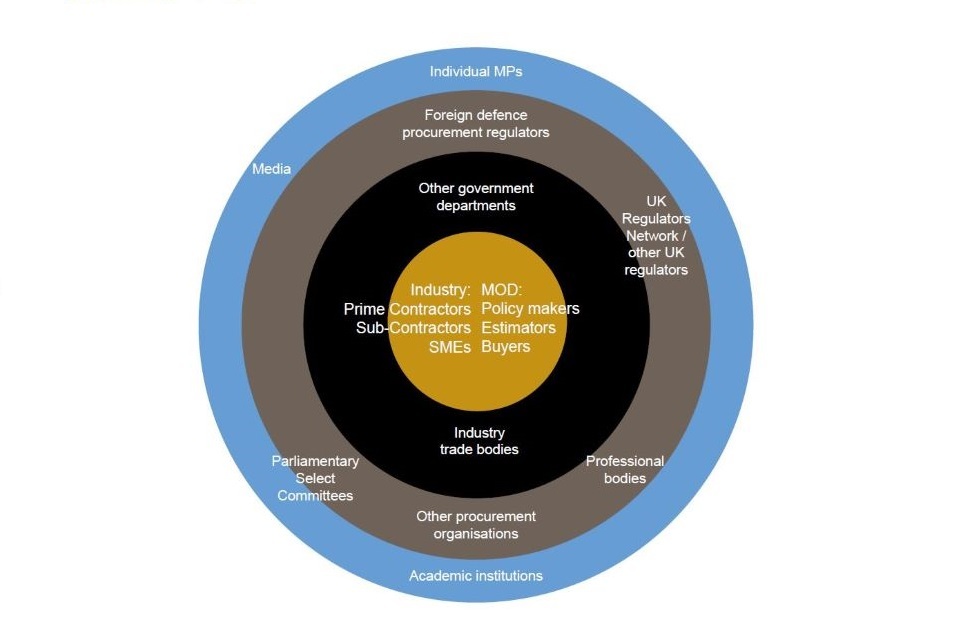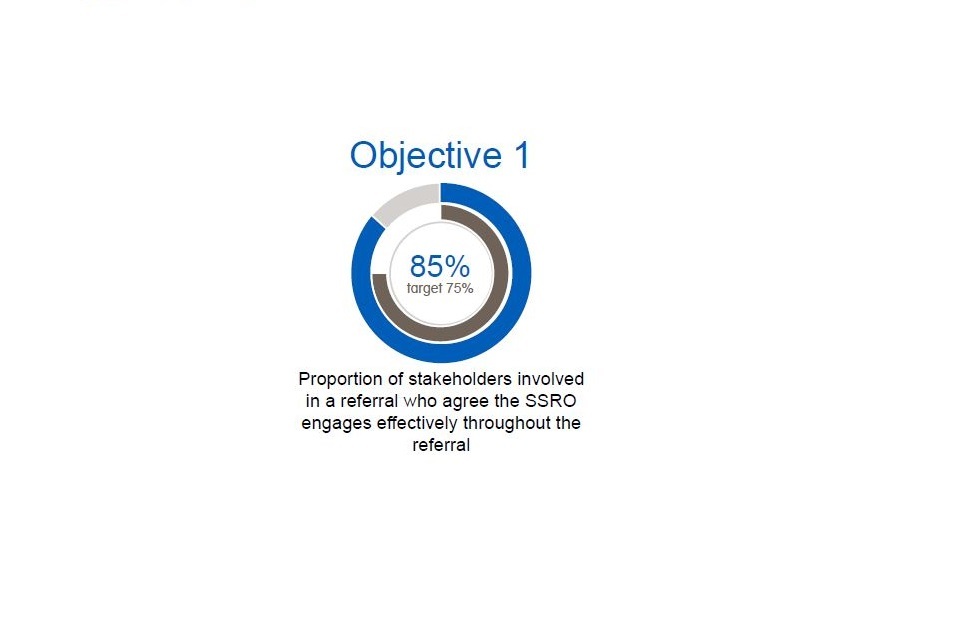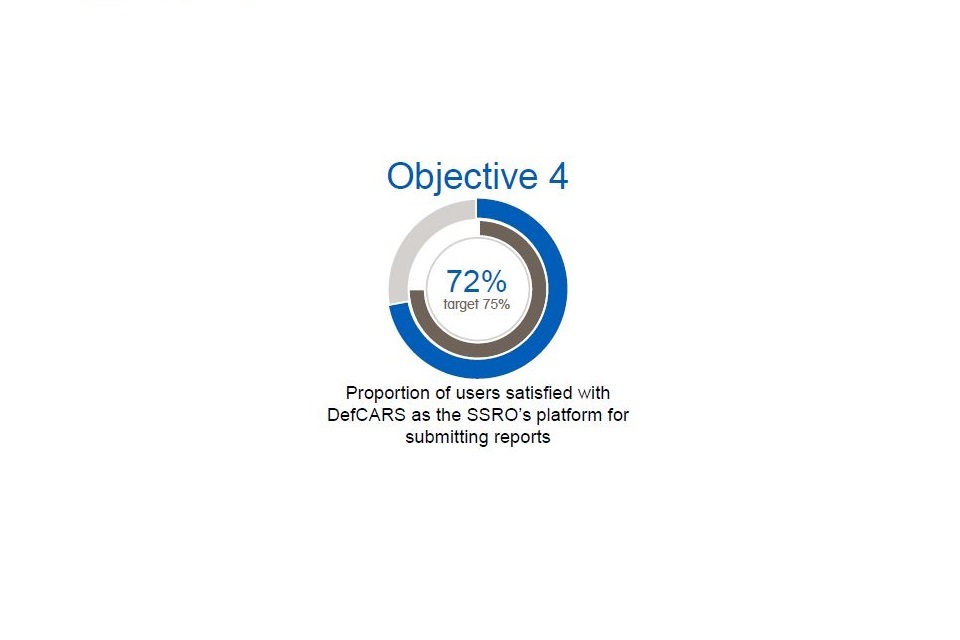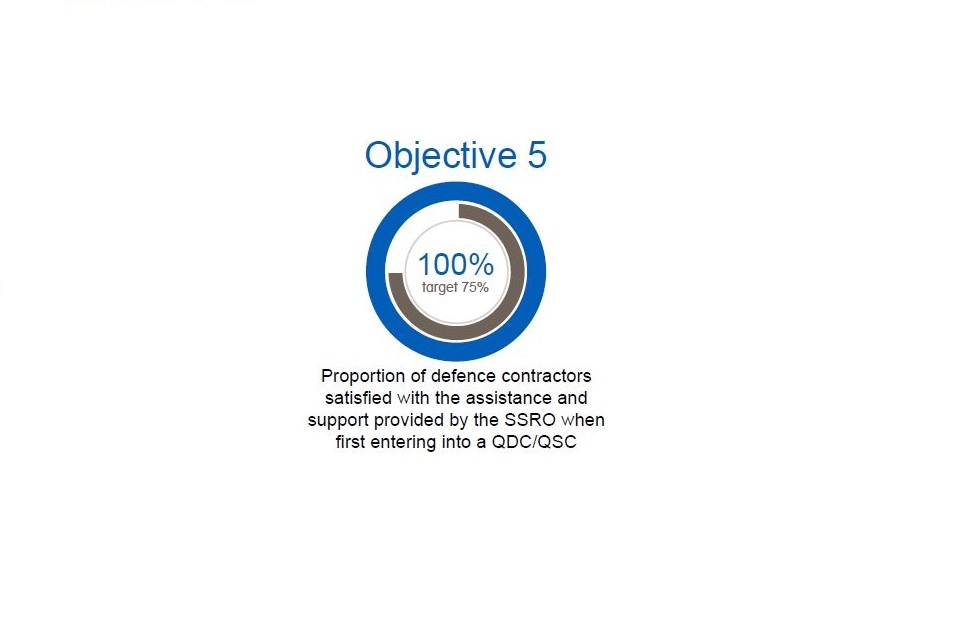Stakeholder engagement strategy
Published 27 July 2020
1. The SSRO
The Single Source Regulations Office (SSRO) is an executive non-departmental public body, sponsored by the Ministry of Defence (MOD). We play a key role in the regulation of single source, or non-competitive, defence contracts.
The SSRO was established by the Defence Reform Act 2014, which also created a regulatory framework for single source defence contracts. We support the operation of the framework, which places controls on the prices of qualifying contracts and requires greater transparency on the part of defence contractors.
The contracts that are subject to the regulatory framework are worth a significant amount, with a total estimated price of £40.8 billion for contracts that became Qualifying Defence Contracts (QDCs) or Qualifying Sub-contracts (QSCs) between 1 April 2015 (when the first QDC was entered into) and 31 March 2020. It is vital that single source contracts efficiently deliver the goods, works and services the UK government needs for defence purposes.
When exercising our statutory functions, we aim to ensure that good value for money is obtained in government expenditure on qualifying defence contracts, and that persons who are parties to qualifying defence contracts are paid a fair and reasonable price under those contracts.
We provide independent, expert leadership on the regulation of single source contracts. By engaging closely with the MOD, industry and other stakeholders, we explore multiple points of view to make technically sound improvements to contract pricing. We draw on best practices from the UK and internationally to develop solutions to identified issues.
2. Introduction
The SSRO recognises that positive, effective engagement with stakeholders is essential to enable us to carry out our role. We will maintain a proactive programme of stakeholder engagement to help us deliver our Corporate Plan 2020-2023, our statutory functions and achieve our vision for 2025.
As part of our goal of continuously improving our engagement, we completed our first stakeholder survey in 2018, and the second in early 2020. We will repeat the survey at appropriate intervals to understand how we are performing.
The survey results have informed this Stakeholder Engagement Strategy, with priority actions responding to issues raised by stakeholders in the survey. Everyone at the SSRO has a role to play in successful engagement. We aim to achieve a purposeful, coordinated and consistent approach to our engagement, informed by this strategy.
The SSRO Board will receive regular reports on our engagement activities and consider their effectiveness. We have a key performance indicator on stakeholder perceptions of our engagement, which we will report on in our Annual Report and Accounts.
Corporate Plan 2020-23
Objective 5
Improve our reach and engagement with stakeholders to build our evidence base, share understanding and increase the benefits of the regulatory framework
Our vision for 2025
- Stakeholders are actively engaged with the SSRO to ensure the benefits of the regulatory framework are realised.
- Stakeholders provide and receive feedback in a meaningful way and believe the SSRO responds in a proactive way.
- Stakeholders understand the SSRO’s priorities and consider they have been actively engaged in helping to identify them.
- Stakeholders believe the SSRO delivers its functions in an effective and efficient way.
- The SSRO uses a range of engagement methods to enable stakeholders to input to and be informed about its work.
- The SSRO engages fully and appropriately with relevant parts of the MOD, including actual and potential users of DefCARS data.
3. Our stakeholders
The diagram below shows the stakeholder groups the SSRO engages with.
We aim to engage in a proportionate way with stakeholders, having regard to their degree of involvement and interest in the regulatory framework. The frequency and depth of our engagement and the number of topics on which we engage will be greatest for stakeholders towards the centre of the diagram below, and progressively lower moving outwards.
We engage frequently on many topics and in detail with some parts of the MOD (e.g. MOD’s Single Source Advisory Team (SSAT), Minister for Defence Procurement) and less so with other parts of the MOD who have infrequent or peripheral involvement with the single source procurement framework. Similarly, some industry stakeholders have many qualifying defence contracts and are active participants in forums such as the OWG, and some companies only have a single QDC that forms a very minor part of their overall business.

Diagram showing stakeholder groups the SSRO engages with
4. Stakeholder survey
The SSRO completed its second stakeholder survey in 2020 to measure the effectiveness of our stakeholder engagement and provide insight into how this could be further developed and improved.
1,121 stakeholders invited to take part in online survey
256 stakeholders completed quantitative survey
20 second round qualitative telephone interviews
11 senior leaders, 65 senior managers, 117 managers, 56 junior managers and officers, and 7 others completed the survey.
The report’s findings were generally very positive. Data for three of our corporate KPIs is set out in the figures on this page.
29% of respondents had a more favourable opinion of the SSRO than 12 months ago and 89% of respondents rated the SSRO’s overall performance in the past 12 months as good or very good. We recognise we still have more to do and we hope planned changes will help us to continue improving our engagement.
Respondents rated highly the SSRO’s operational and face-to-face engagement such as our offer of support (e.g. SSRO Reporting Helpdesk, onboarding for new qualifying defence contractors and DefCARS), site visits, and our stakeholder fora such as the Operational Working Group (OWG), the Reporting and IT Sub-Group.
Respondents constructively highlighted ways to improve our engagement, including:
- examining the timing of consultations (avoiding Summer and Christmas periods), and further improving notification of when consultations are to take place;
- improving SSRO staff knowledge and awareness of defence contracting, from both an MOD and industry perspective and continuing to recruit staff with this experience;
- developing and broadening relationships, particularly within the MOD;
- further improving the usability of the Defence Contract Analysis and Reporting System (DefCARS); and
- improving guidance and how we deliver it.
We have prioritised action in the 2020-2023 Corporate Plan to address this feedback.

Objective 1: Proportion of stakeholders involved in a referral who agree the SSRO engages effectively throughout the referral. 85%, target 75%

Objective 4: Proportion of users satisfied with DefCARS as the SSRO’s platform for submitting reports. 72%, target 75%

Objective 5: Proportion of defence contractors satisfied with the assistance and support provided by the SSRO when first entering into a QDC/QSC. 100%, target 75%
5. Our engagement principles
In all our engagement with stakeholders we are guided by several principles:
- We value stakeholder input and involvement in the prioritisation of our work and their feedback is a key part of our evidence base.
- We provide multiple opportunities and channels for engagement, adapting our approach to accommodate the diversity of our stakeholders and seeking effective dialogue on key issues.
- We maintain engagement mechanisms that are working well and find better ways to reach those where our opportunity for engagement is currently limited or not working.
- We openly communicate the reasons for our decisions so stakeholders can understand what we have done and how their feedback has been considered.
- We proactively help stakeholders with the operation of the regulatory framework by providing impactful training and support.
- We optimise our engagement by continuing to develop our understanding and knowledge of the defence sector.
- We seek to gain maximum benefit from our stakeholders’ knowledge and experience of defence contracting.
- We want all those involved in the regulatory framework to learn and gain insight from its operation and work together to improve its implementation.
6. Communication
We will communicate in a tone and style that is demonstrably open, approachable, authoritative and positive. Some of our information will be technical in nature, but we aim to communicate in ways that make it accessible for different audiences while still providing sufficient detail. We communicate the reasons for our decisions or actions.
We recognise that there will be times, because of the nature of the decisions we make, when stakeholders may not agree with a decision, but we will try to ensure they understand why the decision was taken. The SSRO has a set of clear and consistent key messages about our role and the regulatory framework that we wish to communicate and ask stakeholders to engage with.
- The SSRO is at the heart of the regulatory framework for single source defence contracts, working independently and objectively to support operation of the framework.
- The SSRO supports the MOD and industry to agree prices that are value for money and fair. We give clear, principles-based pricing guidance that facilitates the agreement of contract costs and profits. We apply a clear and robust methodology for assessing and recommending the rates that should apply when calculating contract profit rates.
- We provide independent, expert leadership on the regulation of single source contracts. By engaging closely with the MOD, industry and other stakeholders, we explore multiple points of view to make technically sound improvements to contract pricing.
- DefCARS supports effective analysis and we promote use of the data in support of procurement decisions, contract management and development of the regulatory framework. As a platform for receiving data, DefCARS is secure, efficient and seeks to minimise the reporting burden on contractors. We review report submissions and promote the provision of quality data.
- We proactively support stakeholders to help them understand the requirements of the regulatory framework.We help contractors to submit statutory reports in DefCARS through onboarding support, training, guidance and our Helpdesk.
- The SSRO’s opinions and determinations resolve disputes and clarify contract specific issues. We work to identify and remove barriers to industry or the MOD making referrals.
7. Our engagement approach
All SSRO staff and Board members have a role to play in delivering our objectives and engaging with stakeholders. We seek to actively involve our staff and members and provide opportunities for them to engage.
We engage with our stakeholder organisations at multiple levels. Our Chairman and Chief Executive lead engagement with Ministers, senior MOD officials, the senior leadership of defence contractors and other key stakeholders. They are supported by our Directors and our staff to maintain strong relationships with industry and MOD stakeholders at senior and working level.
We support and participate in a range of regular meetings and groups that enable us to communicate with stakeholders and obtain their feedback. We invite key stakeholders to our Senior Stakeholder Forum (SSF), OWG and Reporting and IT Sub-Group, while also attending other established stakeholder groups.
We engage extensively with stakeholders in the delivery of our statutory functions, including business as usual contact and involvement in specific projects. We seek to expand rather than restrict opportunities for engagement and we are committed to adapting our approach to accommodate the diversity of our stakeholders.
We maintain a number of different channels of engagement such as face-to-face meetings and workshops, telephone and video conferencing, email, written publications and our website. We use the most appropriate mechanism or combination of mechanisms for the circumstance according to the needs and preferences of our stakeholders. For example, we will establish working groups and communities of interest where more extended and intensive engagement is needed to address a difficult issue.
8. Key priorities
- Further develop and broaden our relationships within the MOD There is a growing body of data reported by industry and the MOD continues to grow and develop its use of the data to support procurement decisions and contract management. We will work in partnership with the MOD’s SSAT to broaden our dialogue with a wider range of MOD stakeholders, share learning and increase the benefits to be derived from the knowledge and application of the regulatory framework. We will continue to engage openly and constructively with our existing MOD stakeholders.
- Improve the experience of stakeholders participating in our consultations We will facilitate input from experienced people in the defence sector. Promoting opportunities for discussion and open exchanges of views is a key aim. We will provide advance notice of our plans for engagement, which will be proportionate and use an appropriate range of methods. We will try to avoid consultations during the Summer and Christmas holiday periods or provide additional time for responses where that is not possible.
-
Continuously improve our mechanisms for purposeful engagement with industry and provide proactive support We will continue to purposefully engage with contractors and industry trade associations such as ADS. We will do this through SSRO’s established forums, for example the SSF, the OWG and the Reporting and IT Sub-Group, and through other existing industry or MOD forums, workshops, bilateral meetings and site visits. We will continue to refine how our forums operate, to maximise benefit to us and our stakeholders. We will provide a range of support and assistance to stakeholders to help them understand the requirements of the regulatory framework and to enable them to provide good quality data in the contract and supplier reports, including: high-quality training sessions on the DefCARS system and reporting requirements; webinars, onboarding sessions; and extra support for Small and Medium Enterprises (SMEs). We will maintain a Reporting Helpdesk for contractor queries.
- Continue exchanging ideas, information and learning The SSRO benefits from exchanging information, developing ideas, and sharing good practice with organisations with similar functions. We will engage with government organisations in other countries who play a part in supporting frameworks for effective single source defence procurement, with the UK Regulators Network, and with UK organisations with similar regulatory functions. We will continue to maintain and add to these relationships where they help us to deliver our statutory functions. We will attend conferences and other events and take up speaking opportunities where this helps us to deliver our statutory functions and our Corporate Plan, or where it increases our understanding of the defence sector.
- Continue developing our people to enhance our skills for effective engagement, and support them in their engagement with the right tools and technology We will provide training and development to our staff to ensure that we are effective in listening to and engaging with our stakeholders. We will continue to appropriately manage information about our stakeholders and our engagement with them, including in accordance with data protection requirements, and to make this information efficiently available to those who need to know within the SSRO. We will use systems that are proportionate to our needs and help effectively manage this information.

